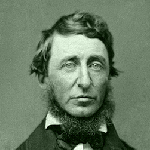Henry David Thoreau was born David Henry Thoreau on 12 July 1817 in Concord, Massachusetts. He became ‘Henry David’ after college, but never petitioned to make the name change legal. He studied at Harvard College between 1833 and 1837 and took classes in rhetoric, classics, philosophy, maths and science. After Thoreau graduated in 1837, he joined the faculty of the Concord public school, but quickly resigned as he disagreed with corporeal punishment. In 1838 he and his brother, John, opened Concord Academy, a grammar school which introduced several progressive concepts such as nature walks and visits to local businesses. The school closed after John died in Thoreau’s arms after becoming fatally ill with tetanus due to a shaving wound.
Thoreau was an intelligent man and a keen philosopher of nature and its relation to the human condition. In his early years he was particularly keen on Transcendentalism. His friend, Ralph Waldo Emerson (1803-1882), encouraged him to contribute essays and poems to a quarterly periodical,
The Dial, which published Thoreau’s first essay,
Aulus Persius Flaccus (1840).
In 1841, Thoreau moved into the Emerson house and worked as the children’s tutor, editorial assistant, and repair man until 1844. Soon after, he began work in his father’s pencil factory which he continued to do for most of his life. In 1845, Thoreau found himself struggling to concentrate on his writing so embarked on a two year experiment in simple living. He moved into a small, self-built house on land owned by Emerson around the shores of Walden Pond. Soon after, in 1846, Thoreau was asked to pay six years of late poll taxes. Thoreau refused due to his opposition to the Mexican-American war and slavery. He spent the night in jail as a result, but was released the next day when someone paid on his behalf. The experience had a strong impact on Thoreau and in 1848 he delivered lectures on ‘The Rights and Duties of the Individual in relation to Government’. He later revised the lecture into an essay entitled
Resistance to Civil Government (1849).
Whilst living at Walden Pond, Thoreau wrote
A Week on the Concord and Merrimack Rivers (1849), an elegy to his brother, John. He could not find a publisher for the book so printed a thousand copies himself, though he sold less than three hundred. In 1847 he moved back into the Emerson house and over the next years he worked to pay off his debts and write
Walden, or Life in the Woods (1854) which recounted the time he had spent at Walden Pond. He left the Emerson house in 1848 and in 1850 moved into a family home where he lived until his death.
In 1851, Thoreau became fascinated with natural history and travel narratives. He became a land surveyor and wrote detailed observations of natural history in his journal. He also kept a series of notebooks which became the source for his later natural history writings, such as
Autumnal Tints (1862) and
Wild Apples (1862). He devoured any travel accounts he could get his hands on and was fascinated by the people, cultures, religions and natural history of the world. He travelled extensively within America, to Quebec, Cape Cod, Maine, Philadelphia, New York, Niagara Falls, Detroit and Chicago. These landscapes inspired his exploration books, such as
A Yankee in Canada (1866) and
Cape Cod (1865). Thoreau was a prolific writer on a number of topics. His titles included
Herald of Freedom (1844),
Slavery in Massachusetts (1854), and
A Plea for Captain John Brown (1859).
Thoreau contracted tuberculosis in 1835 and suffered from it sporadically after that. In 1860 after a night excursion to count the rings of tree stumps during a storm he contracted bronchitis and his health declined until he eventually became bedridden. He spent the remainder of his life editing and improving his works, particularly
The Maine Woods (1864) and
Excursions (1863). He died on May 6 1862 at the age of forty four.


